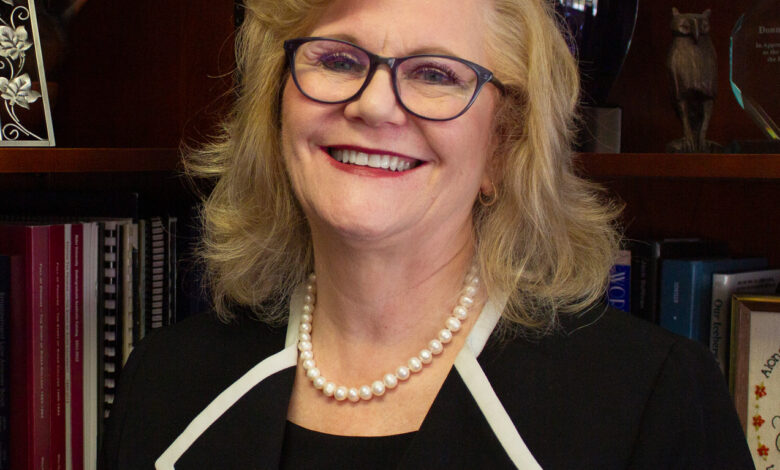
Admin announces no faculty layoffs
By Jake Tiger
Rider will not lay off faculty or eliminate low-enrollment programs ahead of the Oct. 31 layoff deadline, the university provost announced in an Oct. 25 email to department chairs. The decision follows an ongoing program-evaluation process and comments from Rider President Gregory Dell’Omo that alarmed faculty members in August, as he seemed to suggest more cuts could be coming to create a “leaner” institution.
Rider Provost DonnaJean Fredeen said the analysis showed there would not be “significant savings by eliminating programs and laying off faculty.” Instead, the university will look to optimize existing programs and courses with low enrollment.
David Dewberry, a professor and former president of Rider’s faculty union, said, “I’m glad my job is safe but I’m also glad my colleagues’ jobs are safe, because many of them were rightfully worried about potentially paying the consequences for the actions of [the administration], not necessarily their own actions.”
Rider also did not lay off faculty last year, coming to a similar conclusion after evaluating the viability of its programs.
Fredeen said, “Many of the low-enrolled programs have an impact and a contribution to other programs. … The analysis is somewhat complicated because you have such an interwoven aspect to the curriculum that we offer.”
Dell’Omo’s retirement announcement and the impending change in leadership did not factor into the decision, Fredeen said.
The Oct. 31 deadline is the last day Rider can lay off faculty and have the cuts take effect before the next academic year. For example, layoffs on Oct. 31, 2024, are effective Aug. 31, 2025, but layoffs on Nov. 1, 2024, would not take effect until Aug. 31, 2026, according to the faculty union’s contract.
While layoffs are subject to the deadline, the university can still eliminate programs throughout the year as long as faculty are unaffected by the changes. According to the provost, the goal was still to make Rider smaller and more efficient, despite foregoing reductions for now.
“Do we think we still need to be doing some cleanup of the academic portfolio? I will be very honest and say yes,” Fredeen said.
One way the university was considering consolidating its offerings was by combining multiple sections of a course into a larger one, but Quinn Cunningham, a professor and the president of Rider’s chapter of the American Association of University Professors, cautioned this approach by pointing to Rider’s student-to-faculty ratio, one of its main selling points.
Cunningham said, “My hope would be that the administration remains mindful, and I think they will be, of not having too many overly large sections, because one of the nice things about Rider is that we really can know all of our students in our classes.”
During the faculty and staff convocation on Aug. 29, Dell’Omo announced his plans for a “new, smaller Rider” as a result of ongoing operating deficits and the projected, nationwide dip in college enrollment.
The claims heightened concerns within Rider’s faculty union, which has criticized Dell’Omo’s leadership and decision-making for nearly a decade. The union held two votes of no-confidence in Dell’Omo: one in 2017 and one in 2022 that also called for his removal. The union had never held a no-confidence vote on any prior Rider president.
In meetings with administrators following convocation, Cunningham said she was assured that Dell’Omo’s plans were not as foreboding as they may have initially seemed.
“The message that [statement] sent to faculty was that cuts were coming,” said Cunningham. “It sounds like, in some of the discussions that [union] executive members have had with the administration, that maybe was not quite the way the message was supposed to come across.”
When asked if the president would like to expand upon his initial statement at convocation, Rider Vice President External Affairs Kristine Brown offered a statement reading, “The emphasis on being smaller and more nimble extends beyond academic programs; it’s a holistic approach for the entire organization. We’re working to reduce overall expenses and expense structure, and build budgets based on smaller enrollments in light of national trends showing a projected decline in the demographic of college-bound students in the coming years. As President Dell’Omo shared at convocation, Rider aims to develop new, high-demand academic programs more quickly and efficiently, with the necessary resources to support them, while also investing in areas of growth.”
The faculty has often faced the threat of layoffs during Dell’Omo’s tenure, as his first year in office, 2015, began with faculty members forfeiting raises in order to keep their jobs. In recent years, faculty wages have not seen significant increases. Faculty did not receive a pay bump in fiscal years 2023 and 2024 but did see a 0.25% raise this year.
When the union and the administration were negotiating the terms of a new collective bargaining agreement in 2022, Rider’s proposal stated the average faculty salary was $104,600. Using this number, a 0.25% raise equates to an increase of $261.50 annually.
Cunningham and Dewberry both felt there had been efforts from the administration to repair the divide between Dell’Omo and the faculty union by including it in more discussions regarding the direction of the university.
However, Dewberry said, “[The union questions] whether that’s because they sincerely want to involve us or if they’re worried that a new president would come in and look seriously at their performance and whether they should stay here.”


